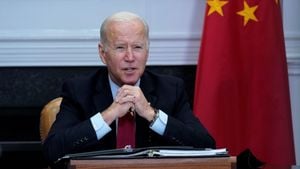The Biden administration has ramped up its efforts to address the contentious issue of Israeli settlements by instituting new sanctions against several groups actively involved in settlement development and related violence against Palestinians. This development, announced shortly before President-elect Donald Trump formally takes office, signifies the U.S. government's persistent attempts to impose accountability on those associated with illegal settlement activities even as it faces increasing pressure from various stakeholders, both domestically and internationally.
This latest round of sanctions primarily targets the Israeli settlement organization Amana, which has been implicated extensively in supporting illegal settlements and outposts throughout the occupied West Bank. Alongside Amana, two additional construction companies, Binyanei Bar Amana and Eyal Hari Yehuda, were also sanctioned as part of this initiative. According to U.S. Treasury Department officials, these firms are accused of contributing to land dispossession of Palestinian-owned properties.
The U.S. State Department described Amana as “the largest organization involved in settlement and illegal outpost development” within the West Bank, reinforcing claims made by various human rights organizations concerning its role in exacerbaging tensions and violence. Matthew Miller, State Department spokesperson, emphasized the need for the Israeli government to take decisive actions against these extremists, stating, “We once again call on the Government of Israel to take action and hold accountable those responsible for or complicit in violence, forced displacement, and the dispossession of private land.”
Sanctions against these organizations mean U.S. citizens are barred from engaging with them financially and their U.S. assets are frozen. The measures will remain intact for the time being as the Biden administration winds down, with the legal infrastructure established to facilitate this separation still active until just ten days prior to Trump’s inauguration.
Concerns are rife within analytical circles as many observers ponder how the incoming Trump administration might deal with these sanctions. Trump has signaled intentions to pursue more favorable policies toward Israeli settlements. His previous administration changed long-standing U.S. positions on the legality of these settlements, embodying support for expansionist Israeli agendas. His cabinet picks are also raising eyebrows; among them, figures who have openly opposed limitations on settlement activity or advocated for the annexation of parts of the West Bank.
Meanwhile, the timing of these sanctions, coinciding with soaring rates of violence against Palestinian civilians, is significant. Amid the increased tensions resulting from Israel’s military actions against Hamas, which have left thousands dead, there has been noticeable backlash from human rights communities demanding stronger measures against state- and non-state actors perpetrated violence against civilians.
Last week, bipartisan groups of U.S. lawmakers called for the sanctioning of senior members of the Israeli government who are attributed as key enablers of settler violence. This includes Finance Minister Bezalel Smotrich and National Security Minister Itamar Ben-Gvir, both of whom have been linked to incitements of violence and radical policies directly targeting Palestinian sovereignty.
“With radical officials in the Netanyahu government continuing to enable settler violence and enact annexationist policies, it is clear greater sanctions are urgently needed,” House Democrats noted in their appeal to the administration. Lawmakers framed their argument by warning about the potential for these volatile actions jeopardizing broader regional stability, including U.S. national security interests.
Complicatively, the U.S. plays a substantial role as Israel’s foremost ally, providing over $3.8 billion annually to support its military capabilities. The Biden administration has authorized an additional $14 billion since intensifying efforts related to the Gaza conflict, aiming to fortify humanitarian efforts. Nevertheless, detractors deem the current sanctions too weak, as they do not reach key figures who effectively drive policy at the governmental level.
Biden's newfound assertiveness reflects changes in the political dynamics of the regions impacted by these settlements. Many community leaders and activists within Palestine and abroad equate current settlements with violations of international law, as they often displace several Palestinian families and impact their livelihoods. The occupation of these lands led to widely criticized economic hardships faced by the Palestinian populace, which many believe warrants stronger action.
Trump's track record raises the specter of potential future reversals on such policies, presenting imminent challenges to Biden's legacy concerning Palestine. It is unclear what concrete steps Trump may undertake upon his return, but there are discussions among various analysts and observers around the likelihood of more lenient policies toward Israeli actions. Notably, several of Trump’s appointees have previously expressed overt support for the settlement movement.
One focal point of contention among settlement supporters is the narrative framing the settlements as communities, rather than illegal enclaves. Figures such as Mike Huckabee, recently announced as Trump’s ambassador to Israel, have categorized these neighborhoods as legitimate extensions of Israeli territory, undermining the rights of Palestinians. Huckabee’s own statements allude to frequent references of Judea and Samaria as biblical lands, corresponding with hardline supporters within the Israeli government.
John E. Hagan, Director of Middle Eastern Affairs at non-profit Peace Now, recently remarked, “Sanctions, though momentarily impactful, should be considered individual punitive measures rather than lasting changes to the on-ground reality.” Analysts agree without consistent enforcement and holistic changes to U.S. policies toward Palestine, danger persists for the people who call the West Bank their home.
With these developments as background, one wonders what ramifications await the Palestinian territories under the incoming Trump administration. Amidst increasing violence and government backing of extremist settlements, renewed international scrutiny is imperative to advocate for the rights of those adversely affected. The quest for lasting peace remains enshrined within calls for accountability not only for the organizations and individuals enabling violence but also for systemic injustices perpetuated against the Palestinian populace. How the duality of U.S. policy shapes humanitarian outcomes on the ground is sure to be subjective to political winds changing winds as Trump potentially prepares to disrupt efforts made during Biden’s term.



